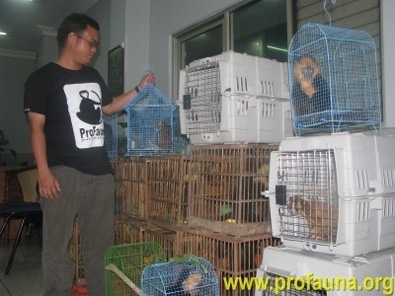Two weeks after ProFauna Indonesia, a wildlife protection organization, launched its survey report on protected wildlife being traded in the animal markets (locally called bird markets) in Java Island, the East Java Police Department with the assistance of ProFauna Indonesia the Humane Society International (HSI), seized dozens of rare wildlife in Ngawi City, East Java on 5th November 2009. The rare animals included 21 slow loris (Nycticebus coucang), a highly unusual and Evolutionarily Distinct species.
This species was listed as ‘Least Concern’ when the EDGE Mammals list was created in 2007 so is not on the current EDGE list, but has since been upgraded to ‘Vulnerable’ on the IUCN Red List; the slow loris is now likely to rank around 200 on the EDGE Mammal conservation priority list, near its relative the pygmy slow loris (Nycticebus pygmaeus), so is a high conservation priority.
The team busted the wildlife vendor who sold his illegal commodities on the main road near the R. Soerjo Monument. The road has been notorious for selling and displaying openly some protected primates for years. The team arrested a suspect. According to ProFauna’s records, the suspect has been selling protected primates, like the slow loris and Javan langur. A slow loris could fetch around 75,000 to 250,000 IDR (or about 7.5 to 25 USD).
ProFauna Indonesia’s campaign officer, Radius Nursidi, stated, “The illegal wildlife trade violates the no. 5 1990 Wildlife Act concerning the Conservation of the Natural Resources and its Ecosystem. It is great that the East Java Police Department has enforced the law by confiscating the wildlife as well as apprehending the suspect.”
ProFauna are pushing for the law enforcement by the Police Department in Ngawi to be emulated by other government authorities in other regions; ProFauna report that 70 bird (animal) markets in Java Island still trade protected species openly and the trade level is still high.
